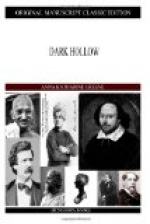“You may, judge.”
“On my return you can all go. I will guard my own property after to-day. You understand me, sergeant?”
“Perfectly, your honour.”
This ended the colloquy.
Spencer’s Folly, as the old ruin on the bluff was called in memory of the vanished magnificence which was once the talk of the county, presented a very different appearance to the eye in broad daylight from what it did at night with a low moon sending its mellow rays through the great gap made in its walls by that ancient stroke of lightning. Even the enkindling beams of the westering sun striking level through the forest failed to adorn its broken walls and battered foundations. To the judge, approaching it from the highway, it was as ugly a sight as the world contained. He hated its arid desolation and all the litter of blackened bricks blocking up the site of former feastings and reckless merriment, and, above all, the incongruous aspect of the one gable still standing undemolished, with the zigzag marks of vanished staircases outlined upon its mildewed walls. But, most of all, he shrank from a sight of the one corner still intact where the ghosts of dead memories lingered, making the whole place horrible to his eye and one to be shunned by all men. How long it had been shunned by him he realised when he noticed the increased decay of the walls and the growth of the verdure encompassing the abominable place!
The cemetery from which he had come looked less lonesome to his eyes and far less ominous; and, for a passing instant, as he contemplated the scene hideous with old memories and threatening new sorrows, he envied Bela his narrow bed and honourable rest.
A tall figure and an impressive presence are not without their disadvantages. This he felt as he left the highway and proceeded up the path which had once led through a double box hedge to the high, pillared entrance. He abhorred scandal and shrank with almost a woman’s distaste from anything which savoured of the clandestine. Yet here he was about to meet on a spot open to the view of every passing vehicle, a woman who, if known to him, was a mystery to every one else. His expression showed the scorn with which he regarded his own compliance, yet he knew that no instinct of threatened dignity, no generous thought for her or selfish one for himself would turn him back from this interview till he had learned what she had to tell him and why she had so carefully exacted that he should hear her story in a spot overlooking the Hollow it would beseem them both to shun.
There had originally been in the days of Spencer’s magnificence a lordly portico at the end of this approach, girt by pillars of extraordinary height. But no sign remained of pillar, or doorway— only a gap, as I have said. Towards this gap he stepped, feeling a strange reluctance in entering it. But he had no choice. He knew what he should see—No, he did not know what he should




